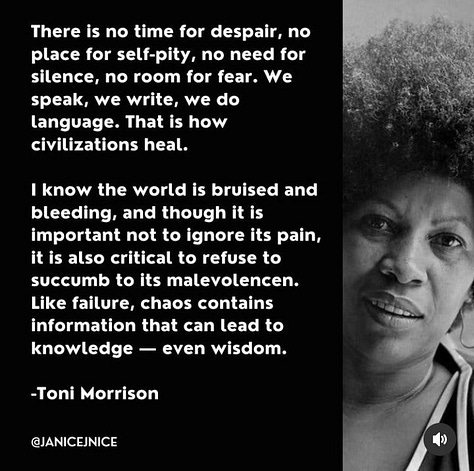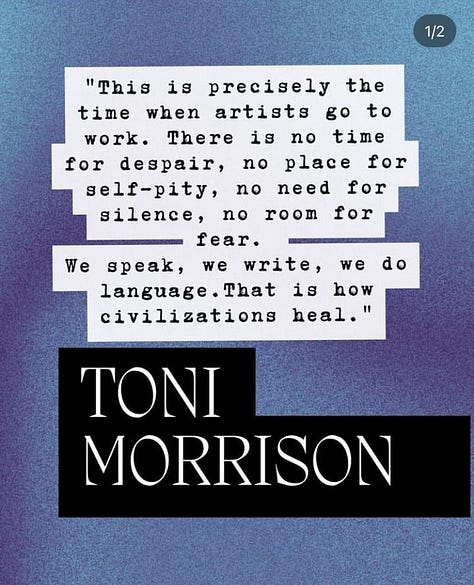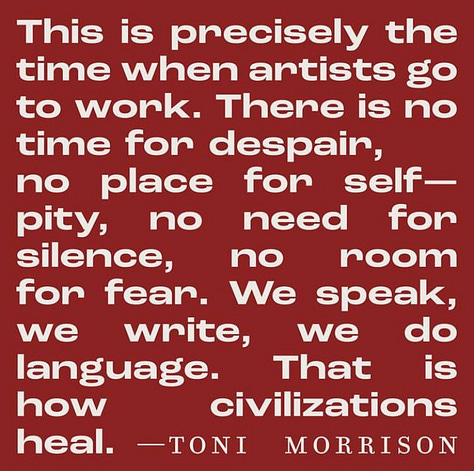Getting to Work
I can’t tell you how many times I’ve seen this quote in the past few weeks.
I was already familiar with it, in an ambient kind of way — it feels like something that has made the rounds in my corner of the internet before, probably in November of 2016, or maybe spring of 2020. Or October of 2023. Or even earlier in the 20-teens when the Black Lives Matter movement was first gaining attention. I couldn’t tell you. I just know I’ve scrolled past it a lot of late, registering familiarity and slight annoyance and moving on.
Actually, I hesitate to put it at the top of this email, because I fear it will make you have the same reaction: you open my email, you see wise old Toni Morrison saying something inspiring about making art in dark times, and you think, Nope. Not today. And you don’t read any further.
I wouldn’t blame you.
So before we continue, rest assured, I am not here to inspire you to bravely make art in dark times. I am also not here to troll our literary mother Morrison, who surely knew more about writing through difficulty than I do. She is not to be faulted for the funhouse mirror that is the internet, refracting any potentially useful thought into a million near-identical copies. I’m not even here to complain about the internet, which is unusual for me.
I’m quite simply interested in pausing on my annoyance at seeing this quote for the third, fourth, tenth time. Because, when allowed the space to unfurl, this annoyance opens up into a whole collection of noticings about the moment we’re in. And — I guess I’ll show my hand — if there’s on task I think artists ought to be grounding into right now, it’s noticing.


So what do I notice as I stare at this quote?
First, that this is a thing artists always do. In moments of social or political crisis, we always start shouting — to each other, to anyone who will listen — about how important art is. We are not frivolous! Look what an important thing we do for society! We may SEEM frivolous, but actually we are very needed and should definitely keep going! In fact we should keep going EXTRA HARD! It is VERY IMPORTANT!!
I don’t know what the instagram feeds of lawyers or doctors look like right now, but I don’t imagine they quite so heavily feature the sentiment, “Guys! We should definitely keep doing our jobs!!” As a class of workers whose value is always being questioned, I don’t blame us for being on the defensive. And, there are plenty of times when I have been the person seeking assurance that I’m not delusional in my desire to make my contribution through art. But it seems that this kind of pep talk has a way of trapping us in talking about art’s essential value, rather than art as simply our terrain. Like lawyering or doctoring or engineering or computer programming, there are lots of ways to exist as an artist, lots of choices to make. Choices that can be risky or less so, more in line with our politics or less so. How nice would it be if we just skipped the step of defending art’s validity as a sector and got right to discussing the questions particular to our terrain?
The other thing I notice is how quickly this quote drops me back into a younger self, one who felt an urgent desire to be useful, and a nagging fear that nothing I did would be enough. Addie of 2014 or 2016 or even 2020 would perhaps have copied this quote into her notebook, both inspired and immensely intimidated. To heal civilization with language! Wow! Okay! But… how?



Leaving aside the fact that you can’t just decide to write the Big Important Thing, that that’s not how writing works, that you just write the next thing, whatever it is,
and leaving aside the fact that we don’t actually have much control over when the ideas we’ve been working on align with a cultural moment and find an audience,
in other words, leaving aside both the time it takes for a good piece of art to ripen and the capriciousness of getting it into the world,
if we think purely about the instinct to “go to work” with greater urgency in this political moment, I don’t think it’s exactly clear to a lot of artists what that going-to-work entails.
The cinematic image, of course, is of the fevered artist sweeping everything off her desk in a single dramatic gesture, laying out a clean sheet of paper, and working tirelessly into the night to emerge at dawn with a masterpiece that “meets the moment.” Which… I’m sure occasionally happens. Right? I’m sure it does.
Actually, I think it does happen in the rare instances when the years of thought work an artist has been doing happen to align with what people need to hear in a particular cultural moment. That occurrence is real, and has a magnetic magic to it. But what about the other 99% of the time, when our attempts to enact the inspired artist archetype result in work that feels shout-y, didactic, and hastily constructed? How do we get away from this mode of working and move towards something more honest?






There’s an essay that’s been circulating since shortly before the election, originally titled “Ten Ways to be Prepared and Grounded if Trump Wins.” If you haven’t read it, do — it has quickly become a useful shared reference point across many different conversations, particularly because it focuses on the terrain that we are all dealing with right now: our own minds. Yes, it touches on coalition building, and organizing strategy, but mostly it talks about how things like fear, intuition, isolation, and trust can be tools that we work with, or tools that are weaponized against us. This feels profound to me, particularly because I can already see, in the people close to me who were most loudly targeted by Trump’s reelection campaign, the emotional toll of living with those threats, before any policy has been enacted. And we know there’s no clear end to living with uncertainty — it’s going to be day by day, week by week, year by year.
To work with the emotions listed above, we have to get good at noticing. Which, I would argue, is the primary task of the artist. To notice, with curiosity, what’s happening in the self and the world around us. To record what we notice, not in order to solve or resolve it, but to open it up, make space for examination, perhaps discovery. We can record what feels clear, sure, but we are more useful when we turn our attention to those thing that feel knotted and contradictory. Seen this way, an artist getting to work does not involve barreling past fear or despair or self-pity, but moving towards those emotions as rich sources of information. Being a good noticer means having the stamina to observe without knowing what conclusion or clever “take” your observations will add up to.
What if we saw this as our task? What would we have made a year from now? What would we know?
It turns out the Morrison quote is from an article she published in The Nation in 2015. In it, she is recounting a period of depression she experienced at another time, back in 2004, when Bush Jr was elected for the second time. She tells us about being on the phone with a friend who admonishes her to not fall prey to her sadness, saying, “This is exactly the time when artists go to work…”
So actually, the quote belongs as much to Morrison’s unnamed friend as to Morrison herself. And what the internet has reduced to a stand-alone piece of wisdom is actually the fragment of a conversation, a phone call between friends. Morrison’s friend, she tells us, called to wish her happy holidays. Maybe he was also calling to check on her; we can’t know. Either way, when asked how she’s doing, she doesn’t just say how her Christmas was; she chooses the more honest and more complicated answer. She tells him she is filled with despair.
In conversations with friends in the days after the election, I noticed how there was often a crossroads: after an initial round of commiseration, there was always a moment where we could either get more specific about what we were thinking and feeling, or move on to other topics. Each time we chose to get more specific, an uncomfortable thing happened: our realities diverged. What had been a clear state of consensus (it’s awful, I know, this fucking country, it’s awful) began to splinter. The scenarios in one person’s mind — about how things might unfold, and on what timeline — never quite matched the scenarios in the other person’s mind. One or both of us would begin to feel self-conscious. Am I being alarmist? Do I sound naively calm? These conversations were unsettling in the way they highlighted the vast territory of unknowns, a territory where there’s no one objectivity to save you. But each conversation also recalibrated my thinking, because each was with someone I trust, whose reality I consider worth taking into account.
I suspect that as the idea of a consensus reality disappears even further in the rearview, we are going to have to ground our reality more in each other. Not in a political affiliation sort of way or who-you-follow-on-instagram sort of way, but in the people we are actually in relationship with. Which means that noticing is not just the task of the artist. There is not much encouragement, in many adult relationships, to speak the thing you are thinking or observing or wondering if you don’t have a point to make about it. But what if the point is to help each other calibrate our realities? What if the point is to pull each other back from the brink of despair, paranoia, states of freeze? In this case, might a kind of sharing that we tend to see as frivolous, overly vulnerable or indulgent be… useful?
As evidenced by this essay, I don’t think Morrison’s friend’s exhortation would have worked on me. I don’t think I would have hung up the phone re-energized to heal civilization through language. But it wasn’t an exhortation to me, or to the world at large. It was to Toni. And apparently it was just what she needed.



Amazing!